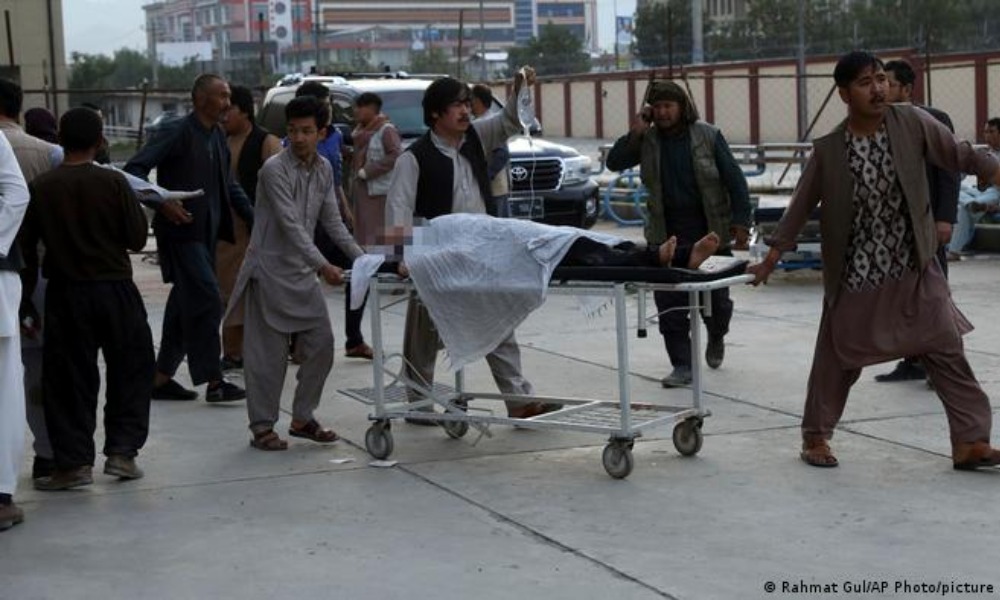Latest News
Death toll from Kabul school bombing rises to 85

The office of Afghanistan’s Second Vice President Sarwar Danish confirmed on Monday that the death toll in the deadly school bombing on Saturday has risen to 85.
Speaking to Ariana News, an official from Danish’s office said 85 people had died and over 150 were wounded.
The deadly bombing targeted a girls high school in Dasht-e-Barchi area in Kabul late Saturday afternoon – a move that sparked an outcry around the world.
Three back-to-back explosions happened. The first was a car bomb that was detonated close to the school. As students and civilians in the area were fleeing the scene of the blast, two IEDs were then detonated.
No group has claimed responsibility for the attack while the Taliban issued a statement rejecting any responsibility.
On Sunday, the Afghanistan Independent Human Rights Commission (AIHRC) said in a statement that the Afghan government has to grant special protection to Hazaras and the community in Dasht-e-Barchi.
The AIHRC said it was government’s duty to protect the Hazara community against crimes against humanity, ethnic cleansing or genocide.
“The Afghan government has an obligation under International Humanitarian Law (IHL) and International Human Rights Law to protect the population at risk of war crimes, crimes against humanity, ethnic cleansing or genocide and international law obliges the government to take measures to end and prevent genocide and war crimes, crimes against humanity and persecution on the basis of ethnicity and gender,” the statement read.
“In October 2020, just over six months ago, more than 40 students died in an attack on Kawsar Danish tutoring center. In May 2020, almost a year ago 11 mothers were murdered with their unborn babies, two boys were, and an Afghan midwife was killed, with 5 mothers injured; this is femicide and infanticide,” the statement highlighted.
The AIHRC stressed that the Afghan government should fulfill its obligations under the International Covenant on Civil and Political Rights “which includes acknowledging massacres targeting Hazaras.”
“The Afghan government should communicate immediately a human rights-based protection plan for Dasht-e-Barchi and West Kabul. This should include plans for collective reparations,” the organization said.
Latest News
Girls’ education is a ‘vital issue’ for Afghanistan: Karzai

Former president Hamid Karzai said in a meeting with Iran’s ambassador and special representative, Hassan Kazemi Qomi, that education of girls was a “vital issue” for Afghanistan.
Karzai said he appreciated Iran’s cooperation and its standing with the Afghan people, especially Iran’s contributions to education in Afghanistan.
During the meeting, Karzai said peace and stability in the region are in the interest of all regional countries.
Latest News
Uzbekistan’s humanitarian aid arrives in Balkh

A shipment of humanitarian aid from Uzbekistan was handed over on Thursday to the local officials of Balkh province in the trade port of Hairatan.
Local authorities said the aid, which includes flour, oil, wheat, sugar and meat, has been handed over by Uzbekistan’s Surkhandarya governor to the governor of Balkh.
The governor of Surkhandarya stated the purpose of sending this aid was to support the people of Afghanistan and stressed the need for the development of good relations between the two countries.
Latest News
Afghanistan’s problems caused more damage to Pakistan than 3 wars with India: Durrani

Islamabad’s special envoy for Afghanistan Asif Durrani said on Wednesday that Pakistan has suffered more due to Afghanistan’s internal situation than Pakistan has suffered in three wars with India in terms of blood spilt and finances drained.
Durrani said at a one-day International Conference titled “Pakistan in the Emerging Geopolitical Landscape”, which was organized by the Institute of Strategic Studies Islamabad (ISSI) and the German Friedrich Ebert Stiftung (FES), that over 80,000 Pakistanis died in the two decades of the War on Terror and that his country was still counting its dead and injured.
“After the withdrawal of NATO forces, it was hoped that peace in Afghanistan would bring peace to the region. However, such expectations were short-lived,” he said.
He also stated that attacks by the Tehreek-e-Taliban Pakistan (TTP) militant group on Pakistan’s border areas increased by 65 percent, while suicide attacks increased by 500 percent.
“The TTP’s enhanced attacks on Pakistan while using Afghan soil have been a serious concern for Pakistan. Another worrying aspect is the participation of Afghan nationals in these attacks,” he said.
Durrani also said Pakistan had suffered geopolitically since the Soviet Union invaded the neighboring country.
“The post-9/11 world order has negatively impacted Pakistan. Apart from losing 80,000 citizens’ lives, including 8,000 law enforcement agency personnel, the country’s economic opportunity cost is estimated at $150 billion,” Durrani said.
Talking about the future outlook for Pakistan in the regional context, Durrani said that while “our eastern neighbor is likely to continue with its anti-Pakistan pursuits, the western border poses an avoidable irritant in the short to medium term.”
However, he said Pakistan can overcome its difficulties with Afghanistan, including the TTP challenge.
-

 Latest News4 days ago
Latest News4 days agoPakistan’s frontiers minister stresses ‘dignified’ return of Afghan refugees
-

 Regional3 days ago
Regional3 days agoIranian president lands in Pakistan for three-day visit to mend ties
-

 Climate Change4 days ago
Climate Change4 days agoMassive river flooding expected in China, threatening millions
-

 Latest News2 days ago
Latest News2 days agoRashid Khan named AWCC’s brand ambassador
-

 Latest News4 days ago
Latest News4 days agoChinese keen to invest in Panjshir-Kabul water conduit project
-

 World4 days ago
World4 days agoTwo Japan navy helicopters crash, one body found, 7 missing
-

 Sport3 days ago
Sport3 days agoKolkata beat Bengaluru by one run in IPL as Kohli fumes at dismissal
-

 Sport3 days ago
Sport3 days agoACL: Aino Mina 3-0 Istiqlal Kabul; Attack Energy 3-0 Khadim
























